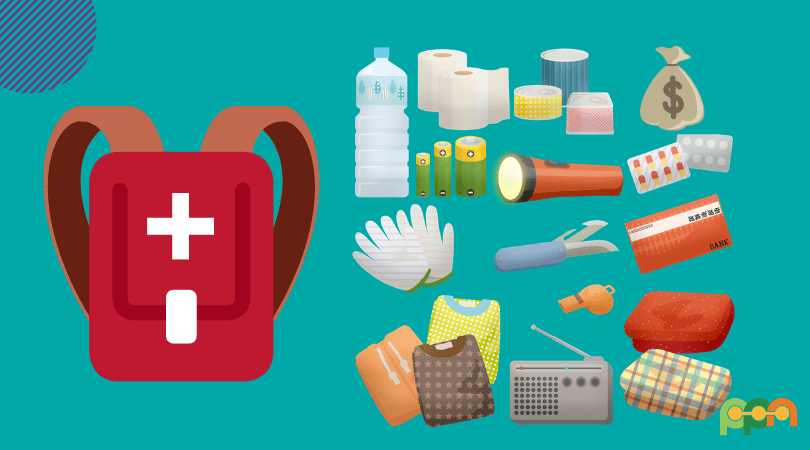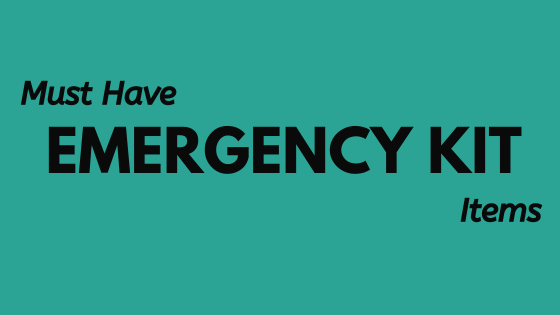Emergencies can happen at any time, so it’s important to have an emergency preparedness kit ready should disasters strike.
When there’s a coming cyclone or hurricane, all media sources, even radio are telling people to prepare. Government and non-government organizations are also on the move preparing food, medicine, evacuation areas, etc, so that after the disaster, they are ready to extend their help to the devastated people.
But this usually happens if we can detect an incoming disaster like a hurricane or a cyclone.
What if it’s an earthquake? Can anyone prepare for that?
Or what if a war broke out or there’s a contagious disease and everyone in your area is not allowed to go outside the house for a few days?
If that happens, do you have the basic emergency preparedness kit in your house?
Because this so-called “basic kit” will definitely save your life and your loved ones.
Governments around the world are always encouraging their citizens to be prepared in light of more frequent disasters, both natural and man-made.
Your basic kit should include everything you need to ensure the survival of you and your family for several days or until help arrives.
At a minimum, you should have the following basic supplies:
Drinking-Water
One of the first things that will get you into trouble in any type of disaster or emergency is dehydration. Make sure you have safe drinking water for several days stored. This should be one gallon per person, per day (3-day supply for evacuation, 2-week supply for home).
A good alternative or emergency water supply plan is a small water filtration system you can use on unsafe water sources to extend drinking water.
Food and Accessories
Next, it’s good to have at least some emergency food supply. This is particularly important if you have small children, pregnant or nursing women, the elderly, or anyone with diabetes or low blood sugar in your family. They can make it even fewer days or hours with food than you can imagine. Keep some easy, ready-to-eat food on hand like granola bars, mixed nuts, biscuits, and canned foods. Make sure you have tools or accessories needed to open the food containers and utensils to eat with.
Focus on foods that are non-perishable, easy to prepare items, and can be eaten cold in a pinch. Chances are power will be out and you’ll have no way to cook or heat the food you’ll be eating. There should be a 3-day supply for evacuation and a 2-week supply for home.
Radio, Flash Light, Batteries, and Cellphone
Next, let’s talk about small electronics, or electric, hand-cranked devices. You want to be able to get the information you need and see where you’re going.
A good flashlight with long battery life is a must, as is a small weather radio and/or a two-way radio. This can be battery-operated or hand-cranked. If you’re using battery-operated devices, having a spare set of batteries in your kit is a must.
Last but not least, when disaster strikes, grab your phone and charger, if possible. You want to be able to get in touch with loved ones as soon as possible.
First Aid Kit
A small first aid kit that includes bandages, alcohol wipes, Band-Aids, scissors, and some basic pain medicines is another must-have. Make sure it also includes any medication you take regularly. If you have family members with severe allergies, antihistamines, or even an epi-pen may be an important and potentially life-saving addition. Prepare for a 7-day supply.
Assorted Tools
There are various tools that may come in handy in an emergency. A good knife is a must and can come in handy in a variety of different ways. A wrench or a pair of pliers is handy if you need to turn off utilities in an emergency. Candles and matches when electricity is out, and on matches when you’re outdoors, you can use them to start a fire.
Lastly, consider adding a whistle and flashing light or emergency flares to your tool kit so you are able to alert rescuers to your location.
Sanitation and Personal Hygiene Items
This is often neglected, but if ever evacuation cannot be avoided, you cannot spare some time just to pack your things especially if it’s an emergency, right? So pack some sanitation items for you and your family especially if you have small children.
Yes, in an emergency, you have to prioritize your safety, but don’t forget that it is also important to make yourself healthy (for the sake of your survival).
Emergency Blanket
This one is also often neglected. If you need to stay at your house, that’s good for you and your family. But what if when you need to evacuate or you need to stay outdoors? This is emergency essential especially if you have kids or the elderly. You can make this multi-purpose. Use it as a blanket or try it as a ground cloth, gear cover, first aid blanket, and more.
Extra Cash
Last, we shouldn’t assume that all banks or ATM machines will be available at all times. When you need to move to a different place, it’s likely that you will need cash in hand. Though credit cards can come in handy, you need to consider if the place that you will be moving to has electric power, or if the terminals are online. So to be sure, always put extra cash into your kit.
Aside from adding it into your emergency kit, you may also want to know what are other ways you can keep your money disaster-proof. We know how valuable cash is not only on natural disasters but also on man-made disasters too.
When a crisis arises, you have to move quickly, grab whatever you can get, and move to a safer place in case it’s not safe to stay in your house. That’s why having an emergency preparedness kit is a must since you can’t think properly because of panic, so instead of packing your things and getting something that isn’t really needed, just put the kit to a place where you can easily grab it. In case you need to stay at your house, this is still essential since you never know when a disaster takes place and you don’t have enough supplies.
And please remember, your basic supplies should be in an easy-to-carry kit that you can use at home or take with you in case you need to evacuate.
Disasters seem to be becoming more frequent and worse and unfortunately, no one can stop them from happening. We should at least be prepared and equipped with a well-stocked emergency preparedness supply kit that will make you and your family safe and comfortable should a disaster strike.

